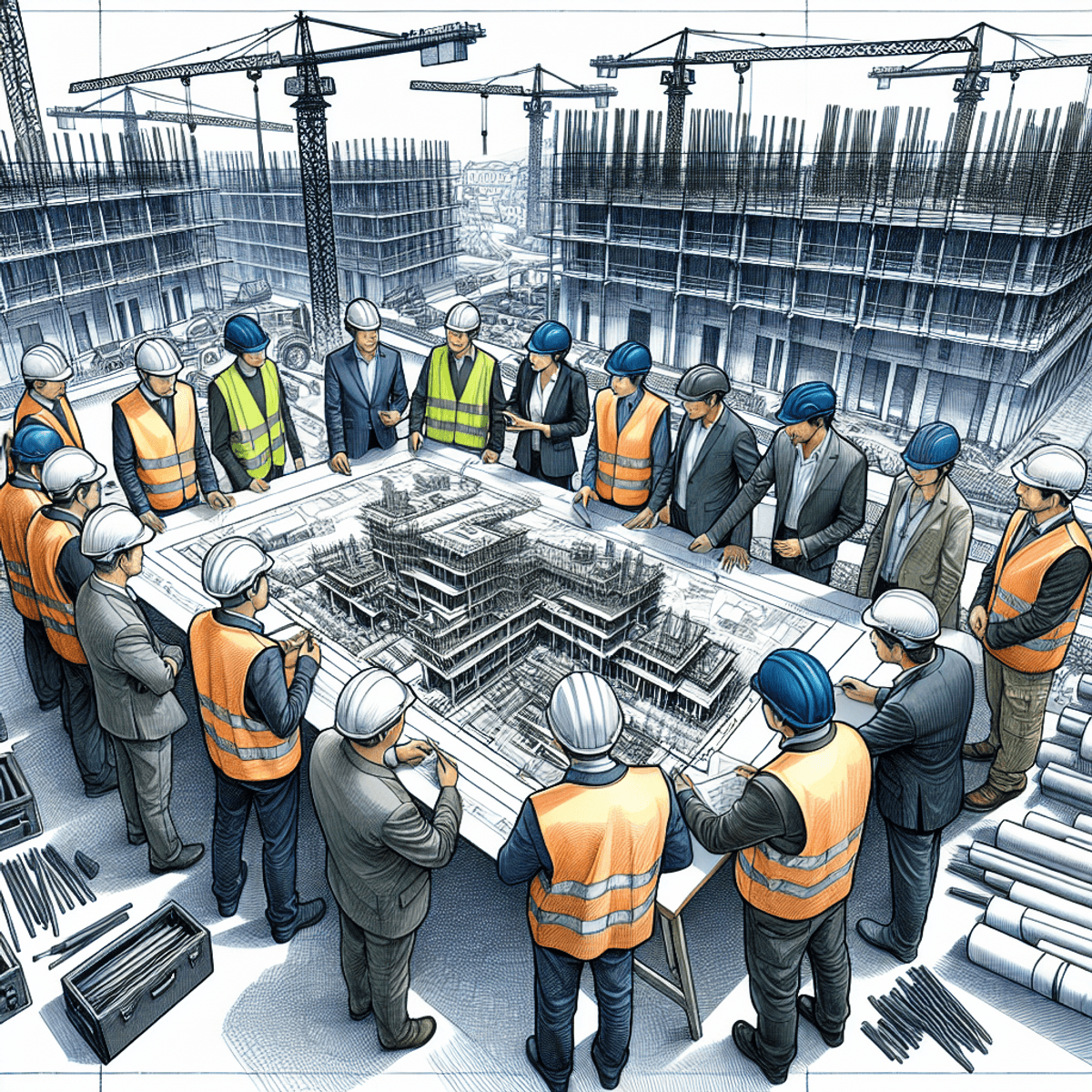Gain insights into immigration procedures in major countries such as the UK, Germany, and Ireland. Understand the obstacles faced by foreign workers and the significance of cultural adaptation. Find out about companies providing accommodation along with visa sponsorships. Stay updated on changing job market trends and take steps towards a fulfilling career in Europe’s booming construction industry.
Introduction
The demand for construction jobs in Europe has surged in recent years. This trend stems from significant labor shortages across various countries, where local workforces struggle to meet the increasing needs of the construction sector.
Asian workers play a vital role in addressing these shortages. They bring essential skills and experience that enhance the productivity and efficiency of European construction projects.
This article aims to provide insights into:
- The current demand for construction roles
- High-demand positions suitable for Asian workers
- The visa sponsorship process necessary for employment
- Challenges faced by these workers
- Opportunities available in this thriving industry
Arming yourself with this information can pave the way for a successful career in Europe’s dynamic construction landscape.
Current Demand for Construction Jobs in Europe
Labor shortages in various European countries have created a significant gap that skilled laborers, particularly from Asia, can fill. The construction industry is facing challenges due to an aging workforce and insufficient local talent.
Key Sectors Experiencing High Demand
The following sectors are currently experiencing a high demand for construction roles:
- Residential Construction: Rapid urbanization has increased the need for new housing developments.
- Infrastructure Projects: Major investments in public transport and road networks require skilled tradespeople.
- Renewable Energy Installations: The shift towards sustainability has spurred growth in solar and wind energy projects.
Countries Offering Opportunities for Asian Workers
The following countries are offering substantial opportunities for Asian workers:
- United Kingdom: The construction sector is booming with ongoing projects across cities and regions.
- Germany: A strong economy coupled with a high demand for skilled labor drives recruitment.
- Ireland: Significant government investment in infrastructure is creating numerous job openings.
These factors highlight the urgent need for skilled labor across Europe, making it an opportune moment for Asian workers to seek employment in the construction industry.
High-Demand Roles for Asian Workers
European construction industries are actively seeking skilled laborers, creating numerous opportunities for Asian workers. Key roles include:
- Electricians: Responsible for installing and maintaining electrical systems. Required qualifications typically include a relevant vocational qualification and experience in wiring and circuitry.
- Plumbers: Focus on the installation and repair of piping systems. A plumbing qualification, along with hands-on experience, is essential for this role.
- Carpenters: Involved in constructing and repairing building frameworks. Proficiency in woodworking and an apprenticeship or certification in carpentry are necessary.
- General Laborers: Perform various tasks that support construction projects. While formal qualifications may not be mandatory, physical fitness and familiarity with construction tools are important.
Skill Requirements
Each of these roles demands specific skills:
- Technical knowledge related to the trade
- Problem-solving abilities
- Attention to detail
Career Growth and Earning Potential
The potential for career advancement is significant:
- Skilled trades often lead to supervisory positions
- Earning potential varies by country but can be substantial, particularly for specialized roles like electricians and plumbers.
These high-demand positions offer not just immediate employment but also long-term career benefits for Asian workers willing to navigate the European job market.
Visa Sponsorship Process for Asian Workers
Understanding the visa sponsorship process in Europe is essential for Asian workers seeking construction jobs. This process typically involves several critical steps:
- Securing a Job Offer: A formal job offer from a company willing to sponsor your visa is mandatory. This step confirms your employment and initiates the visa application process.
- Employer Responsibilities: Employers must navigate the visa sponsorship process, which includes submitting necessary documentation to governmental authorities and demonstrating their commitment to hiring foreign workers.
Country-Specific Immigration Policies
UK
The points-based immigration system requires applicants to accumulate points based on factors like job offer, skill level, and salary. As of April 2024, salary thresholds have increased significantly. Positions in shortage occupations may have lower salary requirements, providing an avenue for potential applicants.
Germany
Germany offers various work visa categories tailored for skilled laborers, including the EU Blue Card. Applicants must provide proof of employment, relevant qualifications, and sufficient language proficiency to qualify.
Ireland
Ireland has implemented streamlined processes aimed at attracting foreign workers. The Critical Skills Employment Permit allows employers to recruit employees in high-demand sectors while easing some application burdens on foreign candidates.
Navigating these immigration policies can be complex, but understanding them is crucial for securing construction jobs in Europe.
Challenges Faced by Asian Workers
Asian workers seeking construction jobs in Europe often encounter various immigration hurdles. These challenges can include:
- Complex visa processes: Navigating the specific requirements for work permits can be daunting.
- Limited job offers: Securing a position from an employer willing to sponsor a visa is critical, yet competitive.
- Language barriers: Proficiency in the local language can affect communication and job opportunities.
Wage negotiations are equally significant. Understanding salary thresholds is essential for meeting immigration criteria. Key points include:
- Ensuring the proposed salary meets the minimum requirements set by immigration authorities.
- Negotiating wages that align with local standards while considering living costs.
Failure to address these aspects may hinder not only visa approval but also long-term career progression within the European construction industry.
Cultural Adaptation and Integration into the Workforce as an Asian Worker in Europe
Cultural adaptation as an Asian worker in Europe is essential for success in the construction industry. Understanding local customs, workplace norms, and communication styles can significantly impact job performance and relationships with colleagues. Key factors include:
- Language Proficiency: Learning the local language enhances communication, fosters teamwork, and demonstrates commitment to integration.
- Cultural Sensitivity: Awareness of cultural differences helps avoid misunderstandings and builds rapport with coworkers from diverse backgrounds.
- Work Ethic Alignment: Familiarity with European work ethics, which may differ from those in Asia, contributes to smoother collaboration on projects.
Employers value workers who adapt quickly to their environment. Successful integration not only improves job satisfaction but also opens doors for career advancement. Building connections within the team leads to a more inclusive workplace, ultimately benefiting both the employee and employer.
Opportunities Beyond Employment
Many companies in Europe recognize the challenges faced by Asian workers and are adapting their recruitment strategies. Offering accommodation support alongside visa sponsorships has become a common practice to attract skilled labor from Asia. This approach not only eases the transition for workers but also enhances job satisfaction and retention rates.
Key benefits of accommodation support include:
- Reduced Living Costs: Employers often provide housing, lowering the financial burden on workers.
- Convenience: Proximity to work sites minimizes daily commuting times, leading to a better work-life balance.
- Community Building: Shared accommodation fosters a sense of belonging among workers, facilitating cultural integration.
By providing these incentives, construction companies create an appealing environment that encourages Asian workers to join their teams. Understanding these opportunities can significantly impact job prospects and overall experience in Europe’s construction industry.
Conclusion
The prospects for Asian workers in Europe’s construction sector remain strong, driven by ongoing labor shortages and the demand for skilled professionals. Staying informed about changing immigration policies is crucial, as these can significantly impact job availability and visa processes.
Key considerations include:
- Monitoring updates on salary thresholds and job classifications within various countries.
- Understanding specific requirements set by employers willing to offer sponsorship.
Exploring job opportunities in Europe’s thriving construction industry opens doors not only for employment but also for career advancement. With the right skills and preparation, you can navigate the application process and secure a position that aligns with your goals. Embrace this opportunity to contribute to a vital industry while enhancing your professional journey in Europe.
FAQ
What types of construction jobs are in high demand for Asian workers in Europe?
Several construction roles are currently experiencing significant demand:
- Electricians: Skilled electricians are needed due to ongoing infrastructure projects.
- Plumbers: Increased housing developments lead to a higher demand for qualified plumbers.
- Carpenters: Those who specialize in woodworking and framing are sought after in many regions.
- General Laborers: Entry-level positions provide opportunities for workers with varying skill levels.
Are there specific qualifications required for these roles?
Qualifications can vary by country, but generally include:
- Trade Certifications: Many employers prefer candidates with recognized trade certifications.
- Work Experience: Practical experience in the construction sector enhances employment prospects.
- Language Skills: Proficiency in English or the local language may be necessary, depending on the country and company.
How does the visa sponsorship process work?
The visa sponsorship process typically involves several steps:
- Job Offer: Secure a job offer from an employer willing to sponsor your visa.
- Application Submission: The employer submits a visa sponsorship application to the relevant immigration authorities.
- Documentation: Provide necessary documentation, including proof of qualifications, work experience, and potentially language proficiency.
- Approval: Upon approval, you can apply for the work visa.
Which countries have streamlined processes for foreign workers?
Certain countries have made efforts to simplify the immigration process for construction workers:
- Germany: Offers various work visa categories tailored for skilled laborers, making it easier to navigate employment opportunities.
- Ireland: Implements streamlined procedures that expedite visa applications for sectors facing labor shortages.
Moreover, the EU-Japan Economic Partnership Agreement has also opened up avenues for easier access to the European job market.
What challenges do Asian workers face when applying for jobs in Europe?
Common challenges include:
- Visa Regulations: Understanding complex immigration laws can be daunting.
- Salary Negotiations: Ensuring salaries meet immigration thresholds is critical but may require negotiation skills.
- Cultural Differences: Adapting to workplace cultures in European countries can be challenging.
Do companies provide accommodation along with job offers?
Some employers recognize the need to attract foreign talent by offering additional incentives such as:
- Housing Assistance: Companies might provide accommodation or financial support towards housing costs.
- Relocation Packages: Some organizations offer comprehensive relocation packages that ease the transition process.
How can prospective workers stay informed about job opportunities?
To remain updated on potential job openings and industry trends:
- Online Job Boards: Websites like Indeed or Glassdoor frequently list construction jobs across Europe.
- Networking Platforms: Engaging on platforms such as LinkedIn helps connect with industry professionals and discover openings.
- Recruitment Agencies: Specialized agencies often focus on placing foreign workers in European construction jobs.
Staying informed about these aspects enhances your


